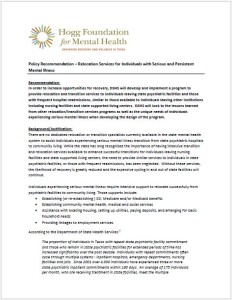Policy Recommendation: Relocation Services for Individuals with Serious and Persistent Mental Illness
Recommendation
In order to increase opportunities for recovery, DSHS will develop and implement a program to provide relocation and transition services to individuals leaving state psychiatric facilities and those with frequent hospital readmissions, similar to those available to individuals leaving other institutions including nursing facilities and state supported living centers. DSHS will look to the lessons learned from other relocation/transition services programs as well as the unique needs of individuals experiencing serious mental illness when developing the design of the program.
Background/Justification
There are no dedicated relocation or transition specialists currently available in the state mental health system to assist individuals experiencing serious mental illness transition from state psychiatric hospitals to community living. While the state has long recognized the importance of having intensive transition and relocation services available to enhance successful transitions for individuals leaving nursing facilities and state supported living centers, the need to provide similar services to individuals in state psychiatric facilities, or those with frequent readmissions, has been neglected. Without these services, the likelihood of recovery is greatly reduced and the expensive cycling in and out of state facilities will continue.
Individuals experiencing serious mental illness require intensive support to relocate successfully from psychiatric facilities to community living. Those supports include:
- Establishing (or re-establishing ) SSI, Medicare and/or Medicaid benefits
- Establishing community mental health, medical and social services
- Assistance with locating housing, setting up utilities, paying deposits, and arranging for basic household needs
- Providing linkages to employment services.
According to the Department of State Health Services:
The proportion of individuals in Texas with repeat state psychiatric facility commitment and those who remain in state psychiatric facilities for extended periods of time has increased significantly over the past decade. Individuals with repeat commitments often cycle through multiple systems – inpatient hospitals, emergency departments, nursing facilities and jails. Since 2001 over 4,000 individuals have experienced three or more state psychiatric inpatient commitments within 180 days. An average of 175 individuals per month, who are receiving treatment in state facilities, meet the multiple commitment criteria. This cyclic process exacerbates the deleterious effects of untreated severe and persistent mental illness and increases the overall cost of care.
Individuals with severe and persistent mental illness who have more complex needs such as physical, cognitive and substance use co-morbidities, past forensic involvement or homelessness are disproportionately represented in the extended and repeat commitment population. People with SMI also experience higher rates of chronic physical illnesses, such as heart disease and diabetes, and are more likely to experience homelessness.
Such individuals require intensive efforts to successfully relocate from psychiatric institutions to the community…
Individuals experiencing serious and persistent mental illness should have access to the same level of intensive relocation and transition support services as those residing in other institutions. Texas should use the lessons learned through other relocation programs, consider the unique needs of individuals living with serious mental illness, and develop and implement comparable relocation and transition services and supports for individuals residing in state psychiatric facilities.

